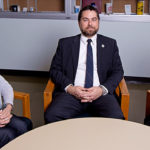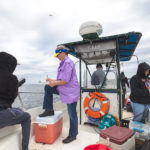UWF Haas Center to Study Voting Process in Escambia County
Pensacola – In cooperation with the Escambia County Supervisor of Elections Office, the Haas Center is undertaking a new study to determine how satisfied voters are with types and availability of voting options. The study will assess the ease and efficiency of the voting process and the voters’ knowledge of voting options, locations and other general election information.

“For quite some time we have wanted to conduct a study to try to gauge voter attitudes and opinions in Escambia County,” said David Stafford, Escambia County supervisor of elections. “With higher voter participation in a presidential election year, this seemed like the perfect time to conduct this project.”
The study won’t look at whom people are voting for, but rather will determine how the process is working for voters.
“We are looking to see what voting method voters chose and why, where they get their election information, and how knowledgeable they feel the election workers are at the polling location or early-voting site,” Stafford said.
The project will be completed in two phases, said Amy Newburn, assistant director of the Haas Center.
“The research will be starting up with a pilot study for the August primary and then larger data collection for the November general (election),” Newburn said.
Data collection will consist of two parts, post-election phone surveys and early voting/election day intercept surveys.
The project is funded jointly by the supervisor of elections and a grant from the Center for Research and Economic Opportunity’s Northwest Florida Asset Valuation and Marketing Support Program.
“We realized we have a world-class research center right here at UWF and felt it was the best partnership,” Stafford said. “We have been meeting with the staff and discussing this project for several months now.”
Newburn said that the Haas Center staff was particularly interested in looking at the voting process.
“The supervisor of elections has been eager to explore the relationships between voters, the voting process and satisfaction for some time,” she said. “We are more than happy to facilitate research that gives local agencies an opportunity to better understand our community.
The analysis will continue through the end of the 2016 with the final findings released in 2017.
“We expect the rough draft of the findings to be delivered in December and the final draft in January,” Newburn said.
Research can be a valuable tool to help define and clarify objectives, according to Newburn.
“I think it is always important to take stock of one’s organization or delivery of services when possible,” Newburn said. “Investing in research can help provide answers for so many topics, including meeting internal goals, marketing needs, providing services cost-effectively and verifying your program delivery.”
The final report will be invaluable to his agency, Stafford said.
“We are confident that the finished project will provide us with valuable insights moving forward,” he said. “The data will help us provide better service for our voters and our election workers.”



